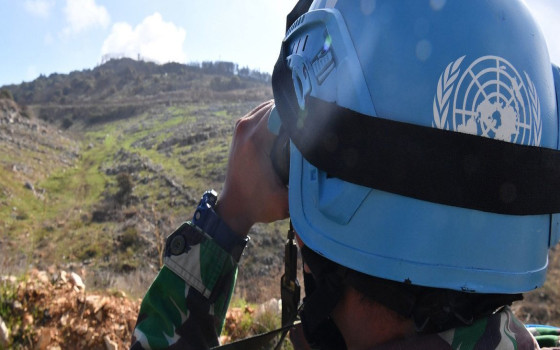
UN: Attacks on UNIFIL peacekeepers are unacceptable.. Lebanon: 50,000 additional people displaced due to ongoing Israeli evacuation orders

- Europe and Arabs
- Saturday , 2 November 2024 7:30 AM GMT
Capitals: Europe and the Arabs
The United Nations Office for the Coordination of Humanitarian Affairs (OCHA) reported that an estimated 50,000 people have left the eastern Lebanese city of Baalbek within days, following a new evacuation order issued by Israel.
OCHA spokesman Jens Laerke said that the displaced people mostly headed to areas in the northern Bekaa Valley, where many people spent the night in their cars. According to the UN daily news bulletin, a copy of which we received this morning, Saturday
Speaking to reporters in Geneva on Friday, Mr. Laerke pointed to a significant increase in displacement to a total of more than 842,000 people - more than half of them women and girls - due to "ongoing evacuation orders" issued by the Israeli army and subsequent airstrikes.
He said that the urgent humanitarian appeal launched to collect $426 million was only 16 percent funded, equivalent to $73 million.
More than 55 attacks on health care
For her part, Margaret Harris, a spokesperson for the World Health Organization, reported that 55 attacks on health care had been verified, “but the Lebanese Ministry of Health reported that the numbers are much higher, with many workers killed or injured while off duty.”
She said that health care systems are under severe pressure, and health workers are exhausted and displaced, “so we continue to lose health workers at a time when they are most needed. We repeatedly emphasize that health care must not be targeted. Health workers are not a target.”
For his part, Jean-Pierre Lacroix, Under-Secretary-General for Peace Operations, stressed that attacks on peacekeepers in Lebanon are unacceptable and constitute a violation of international law, noting that he has repeatedly reminded the parties of their obligation to protect peacekeepers, stressing that ensuring their safety and security “is not an option, it is an obligation.”
The UN official spoke - in an interview with UN News - about the injury of eight peacekeepers since the beginning of the ground operation in Lebanon, and said, "Fortunately, all of them are fine."
He added, "But this shows the kind of risks that peacekeepers are exposed to, and therefore, more than ever, we need to reiterate to the parties that they need to respect their international obligations to protect the safety and security of peacekeepers."
Time for a Ceasefire
Jean-Pierre Lacroix said that the time has come for a ceasefire in Lebanon, stressing the importance of the UN efforts being made in this regard. He stated that UNIFIL peacekeepers are remaining in their positions and are determined to continue doing what they have been assigned to do.
He said that UNIFIL has the overwhelming support of member states, the full support of troop-contributing countries and the rest of the international community, "and this is of utmost importance. We have seen this time and time again."
A deliberate decision to remain
On the other hand, Lacroix said that the Israeli authorities have asked UNIFIL forces to move 5 kilometers north of the Blue Line. Israel said that the purpose of this is to "protect the safety and security of peacekeepers."
“But we made a very deliberate decision that it was very important to stay, first of all because we have a mandate and we have to abide by it, and the peacekeepers have to stay. Secondly, because we thought that if those positions along the Blue Line were abandoned, they would probably be occupied by one of the parties, and that would be very bad for many reasons, including the perception of the integrity and neutrality of the United Nations. At the same time, we continue to monitor the situation every day, and of course the safety and security of our peacekeepers is the top priority,” Lacroix added.
UNIFIL is a reflection of the United Nations
The UN official described the UNIFIL mission as “a reflection of what the United Nations is.”
“We have more than 40 countries – from every continent – contributing troops. It’s a very diverse mission. The peacekeepers are very committed to their mandate and their duty, and I’ve seen that time and time again, and we can see that perhaps more clearly than ever before, in terms of what they do. Of course, these are not easy circumstances for the peacekeepers at the moment, but they are very resilient. We have also done what we can to enhance the physical protection of our positions, to enhance sustainability by making sure that there are enough supplies for several days, and that was done before the ground operation. But what is very unique and crucial is the motivation, the resilience and the strength of the peacekeepers, the men and women, under the leadership of the Force Commander, General Lazaro,” he added.












No Comments Found